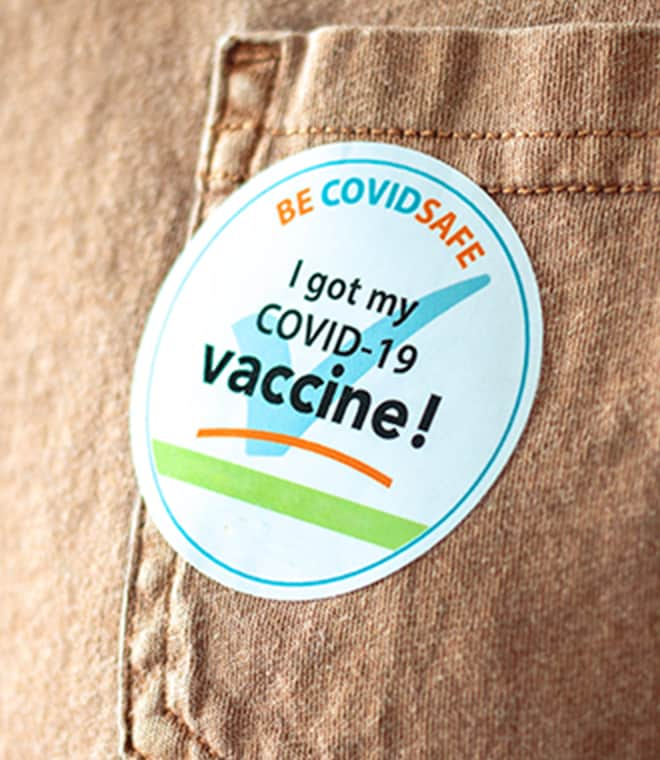Health
The flu shot: What you need to know
By Ashley McClure-Wolfson, PharmD, BCACP, AAHIVP Sep 06, 2024 • 8 min
Getting a flu shot each year is the best way to protect yourself against the flu, and with COVID-19 around, a flu shot may be even more important. Receiving a flu vaccine reduces the chance of flu-related provider visits and hospitalizations, which can free up healthcare resources for others and protect vulnerable populations during the pandemic.
What is the flu?
Influenza (the flu) is a respiratory illness, which means that it affects your airways. It is spread easily from person to person through coughing, sneezing and even talking. When you get the influenza virus, it sometimes takes one to four days before you start noticing symptoms. This means that you could spread the flu to those around you before you even know that you're sick. Adults are most contagious during the first three days of illness and may be able to spread the flu for up to seven days after first becoming sick. Children may continue to spread the flu for even longer.
Is the flu dangerous?
The symptoms of the flu can range from mild to severe. If you get the flu, you may experience a sudden cough, sore throat, aches, fatigue, and fever (although not everyone develops a fever). People who are 65 years or older, those with certain health conditions (such as asthma, heart disease or diabetes), pregnant women and young children are considered high risk and are especially vulnerable to the flu and its complications. Every year, thousands of people die in the United States due to the flu, and even more are hospitalized. Minority populations have higher rates of flu-related hospitalizations. Non-Hispanic Black people have the highest rates of flu-related hospitalizations, followed by American Indian and Alaska Native populations and Hispanic and Latino populations. Minority populations also have lower rates of flu vaccination. Flu vaccination rates for the 2022-2023 season were estimated to be 37% among Hispanic adults and 43% for non-Hispanic Black adults, compared to 51% for non-Hispanic white adults.
How do I protect my family and myself from the flu?
Getting a flu shot each year is the best way to be protected against the flu. The CDC recommends that everyone 6 months of age and older get the flu vaccine every year.
I've heard there are different flu vaccines available. Which one is right for me?
There are several different flu vaccines, and your pharmacist or other healthcare provider can help decide which one is right for you. The CDC does not recommend one flu vaccine over another. The most important thing is that you get a flu vaccine every year.
All flu vaccines are trivalent (three components), meaning they are designed to protect against three different flu viruses. The flu shots are injections that are administered into your upper arm. The flu shots do not contain a live virus and are either inactivated or recombinant (contain no influenza virus at all).
There is also a nasal spray. The nasal spray contains live-attenuated (weakened) influenza virus, and it’s also trivalent. The nasal spray flu vaccine may be an option for healthy people between the ages of 2–49, who aren't pregnant or do not have a weakened immune system.
People who are 65 years and older have additional options. Older adults have the option of receiving either a high-dose or adjuvanted flu vaccine. These flu shots are specifically formulated for seniors and, in past studies, have demonstrated better protection against the flu in people 65 and older.
How does the flu vaccine work?
There are several different kinds of flu vaccines available today. The flu shot is either made with inactivated or killed viruses or no virus at all. The vaccines that do not contain the virus are called recombinant vaccines, and they only contain certain proteins found in the influenza virus, known as subunits. The nasal spray flu vaccine is made with live viruses that have been rendered too weak to cause any illness. This type of vaccine is called a live-attenuated vaccine. Regardless of which type of vaccine you get, your body creates antibodies that protect you from the flu by attacking the virus.
How effective is the flu shot?
The vaccine formulation changes every year to try to match the influenza viruses that are spreading in our communities. The vaccine is more effective when it has a good match. Even if a flu vaccine was not well-matched, it is still beneficial to get vaccinated. If you do get the flu after vaccination, the influenza illness may be less severe than if you had not been vaccinated. Getting vaccinated also helps to protect your community by promoting herd immunity.
Overall, receiving the flu vaccine usually reduces the risk of getting the flu by between 40% and 60% among most people when the vaccine is well-matched with the isolated virus. Some people respond better than others to the flu vaccine and build stronger immunity. People over 65 typically build weaker immune responses to the influenza vaccine, which is why there are flu vaccines made especially for seniors.
What is herd immunity?
Another term for herd immunity is community immunity. When enough people in a community are vaccinated against a particular virus, the virus won't be able to easily spread. Some people can't get vaccinated, and others are vaccinated but don't have strong immune responses. These people are especially vulnerable and rely on herd immunity for protection against diseases. Every time you get vaccinated, you are protecting yourself, your family and your community.
When should I get the flu shot?
The flu season varies from year to year, but it has been known to start as early as October, peak in the winter months between December and February, and then it may continue until as late as May. The CDC recommends getting the flu vaccine early in the fall before the flu season begins, ideally no later than the end of October. It takes about two weeks after vaccination for your body to build up antibodies against the flu. It's better late than never, though. Even if you don't get the flu vaccine until January or later, you can still benefit from it.
It's important to get the flu vaccine every year. The antibodies that you create to build immunity to the flu will decrease with time, so you need a new vaccine to renew your supply of antibodies. The flu viruses are also constantly changing, which is why there is a new formulation every year.
Where can I get a flu shot?
There are more places than ever to get your flu vaccination. Healthcare provider offices, clinics and health departments offer the flu shot, but you may need to make an appointment in advance. Pharmacies have become an easy and convenient option to get your flu shot. At Walgreens, we offer flu shots to everyone 3 years and older. You can make an appointment online, through our app or by calling 1-800-WALGREENS (1-800-925-4733).
What do seniors (65 years and older) need to know about the flu vaccine?
Compared to younger adults, people who are 65 years and older have a greater risk of developing serious complications from the flu. It has been estimated that in recent years, seniors have accounted for 50% to 70% of seasonal flu-related hospitalizations and 70% to 85% of seasonal flu-related deaths. In addition, seniors typically develop weaker immune responses to the flu vaccine. That's why there are flu vaccines specifically designed for seniors—the high-dose flu vaccine and the adjuvanted flu vaccine.
Compared to a regular flu shot, the high-dose vaccine has four times the amount of antigen, which is the part of the vaccine that triggers the immune response. The adjuvanted flu vaccine contains an extra substance called an adjuvant that helps the vaccine work better by giving you a stronger immune response. Both the high-dose vaccine and the adjuvanted flu vaccine have demonstrated stronger immune responses in people 65 and older as compared to those who received the standard flu shot. Note that older adults can get any flu vaccine approved for use in their age group, including the standard-dose flu vaccine.
Can I get the flu shot if I'm pregnant?
Yes, the CDC recommends receiving a flu shot during pregnancy. In fact, it is recommended that all women who are pregnant, or may become pregnant during the flu season, receive a flu shot during any trimester. A flu shot protects both the mother and the baby from getting the flu since the mother can pass some of the antibodies on to the baby. Any of the age-appropriate flu shots may be used. It is important that pregnant women receive a flu shot instead of the nasal spray flu vaccine. The nasal spray flu vaccine is not recommended during pregnancy.
What are the flu vaccine side effects?
Common flu shot reactions include redness, soreness or swelling in the area where the shot is administered. The nasal spray could cause different side effects, such as runny nose, sore throat or a cough. These side effects are usually mild and short-lived.
Some people may also develop a low-grade fever or body aches. Similar to the other side effects, these symptoms are usually mild and quickly go away on their own. While some of these side effects may feel flu-like, it's important to remember that flu vaccines will not make you sick with the flu. Allergic reactions to the flu shot are rare.
Can you get the flu from the flu shot?
No, you cannot get the flu from the flu vaccines. Flu vaccines given with a needle (i.e., flu shots) are made with either inactivated (killed) viruses or with only a single protein from the flu virus. The nasal spray vaccine contains live viruses that are weakened so that they do not cause illness.
While some people may experience a low-grade fever or body aches as a side effect, that does not mean the vaccine gave them the flu. For example, if you got sick with the flu shortly after receiving a flu vaccine, it means you were exposed to the flu before your body had the chance to fully develop the antibodies needed. It takes about two weeks after receiving the vaccine before you're protected against the influenza virus.
Who should not get the flu vaccine?
Children younger than 6 months are too young to receive a flu vaccine.
If you have ever had a severe allergic reaction to any influenza vaccine or to any of the ingredients in the flu vaccine, you should not get the flu vaccine again, even if it's a different formulation. If you have experienced the neurological disorder Guillain-Barré syndrome that causes paralysis, you should talk with your healthcare provider before getting the flu vaccine. Some people with a history of Guillain-Barré syndrome should not get a flu vaccine. If you are not feeling well, talk to your healthcare provider before receiving a flu vaccine.
If you are interested in the nasal spray influenza vaccine, there are a few more things to know. Because it contains a live virus, you should not get the influenza nasal spray if you are pregnant, have a weakened immune system or are in close contact with people who have a weakened immune system (such as those receiving chemotherapy) or have taken an influenza antiviral medication within the last 48 hours.
Children and adolescents who receive aspirin or salicylate-containing medication should not receive the influenza nasal spray, nor should young children between the ages of 2 and 4 who have experienced an episode of wheezing in the last 12 months or who have been diagnosed with asthma. People with chronic health conditions such as chronic obstructive pulmonary disorder (COPD) or diabetes should talk with their healthcare provider before receiving the influenza nasal spray.
What if I have an egg allergy?
Most flu shots and the nasal spray flu vaccine are made using egg-based technology and may contain a small amount of egg proteins. However, studies show that severe allergic reactions to the flu shot and nasal spray vaccine are unlikely in people with egg allergies. People who have experienced only hives after exposure to eggs can receive any influenza vaccine. If eggs have given you serious allergic reactions, meaning any symptom other than hives, you can still receive any of the available influenza vaccines, but you should receive it in a healthcare provider's office, hospital, clinic or health department under the supervision of a healthcare provider who can recognize and manage severe allergic reactions. Your provider may recommend that you receive the egg-free influenza vaccine.
Is there mercury in the flu shot?
Vaccine vials that contain more than one dose, contain thimerosal, which is a mercury-based preservative. These multi-dose vials have a preservative because every time a needle enters the vial, there is a risk of introducing bacteria or fungi, which could be dangerous. Thimerosal protects the vaccines from contamination. Our bodies remove thimerosal quickly and easily, so it does not stay or build up in our system. Flu vaccines available as single-dose, pre-filled syringes and nasal spray formulations of the flu vaccine do not contain thimerosal.
I need to get my pneumonia shot this year. Which one should I get first, the pneumonia shot or the flu shot?
You can receive both the pneumonia vaccine and the flu vaccine at the same time.
Can I get a flu vaccine at the same time as a COVID-19 vaccine?
Yes, according to the CDC, it is safe to get a flu vaccine at the same time as a COVID-19 vaccine. You can get the COVID-19 vaccine with other vaccines on the same day or during the same week.
What are other ways I can protect against the flu?
In addition to your yearly flu vaccine, there are a few other things you can do to protect your family and yourself from the flu. There are daily precautions you can take, such as limiting contact with sick people as much as possible and washing your hands with soap and water often. If you have received a prescription for flu antiviral medications, it's important to take them as directed by your healthcare provider.
But remember, the No. 1 way to protect yourself and your family against the flu virus is to get vaccinated every year.
Clinically reviewed and updated by Rebeca Thomas RN, BSN, CPHQ, September 2024.
- https://www.cdc.gov/flu/index.htm
- https://www.cdc.gov/flu/symptoms/flu-vs-covid19.htm
- https://www.cdc.gov/flu/highrisk/disparities-racial-ethnic-minority-groups.html
- https://www.cdc.gov/mmwr/volumes/73/rr/rr7305a1.htm
- https://www.cdc.gov/flu/spotlights/2023-2024/flu-vaccine-benefits.htm
- https://www.vaccines.gov/basics/work/protection/index.html
- https://pharmacist.therapeuticresearch.com/Content/Segments/PRL/2021/Oct/Flu-Vaccines-S2110002
- https://www.ninds.nih.gov/health-information/disorders/guillain-barre-syndrome
- https://www.cdc.gov/vaccinesafety/concerns/thimerosal/index.html
- https://www.cdc.gov/flu/prevent/vaxsupply.htm
- https://www.cdc.gov/vaccines/hcp/vis/vis-statements/flulive.html
- https://www.cdc.gov/pneumococcal/hcp/clinical-signs/?CDC_AAref_Val=
- https://www.cdc.gov/pneumococcal/clinicians/clinical-features.html
- https://www.cdc.gov/flu/prevent/flushot.htm
- https://www.hhs.gov/immunization/basics/index.html
- https://www.cdc.gov/flu/highrisk/index.htm
- https://www.uptodate.com/contents/pneumococcal-vaccination-in-adults/print
- https://www.cdc.gov/flu/prevent/coadministration.htm
- https://www.cdc.gov/flu/prevent/actions-prevent-flu.htm
- https://www.cdc.gov/flu/prevent/egg-allergies.htm
- https://www.cdc.gov/flu/prevent/misconceptions.htm



